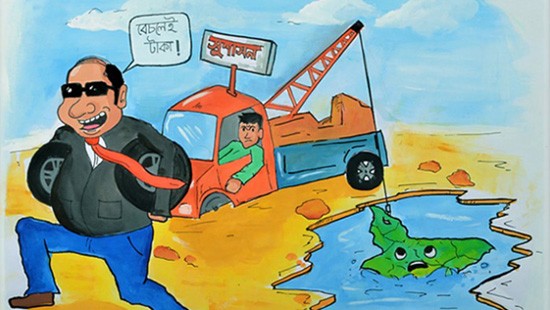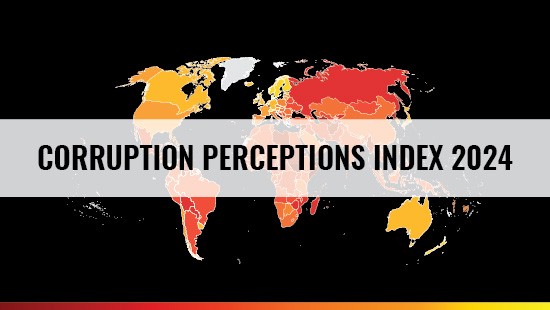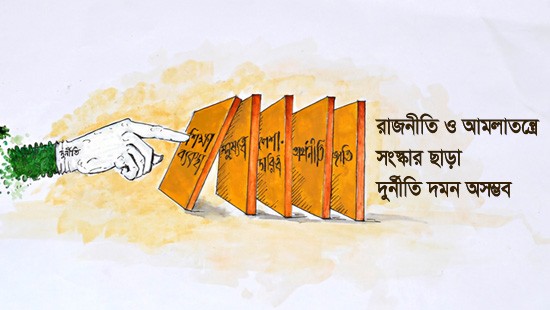Published: 04 December 2013
Bangladesh in CPI 2013
Iftekharuzzaman
 The Corruption Perceptions Index (CPI) 2013 was released by Transparency International (TI) on December 3. On a scale of 0-100, Bangladesh has scored 27, just one point higher than in 2012 and the same as in 2011, and has been ranked 16th from bottom, 3 steps higher than that in 2011 and 2012. Counted from the top, Bangladesh has ascended by 8 positions to 136th among 177 countries, compared to 144th among 176 countries in 2012.
The Corruption Perceptions Index (CPI) 2013 was released by Transparency International (TI) on December 3. On a scale of 0-100, Bangladesh has scored 27, just one point higher than in 2012 and the same as in 2011, and has been ranked 16th from bottom, 3 steps higher than that in 2011 and 2012. Counted from the top, Bangladesh has ascended by 8 positions to 136th among 177 countries, compared to 144th among 176 countries in 2012.
Most disappointingly, Bangladesh remains the second worst performer in South Asia, better than only Afghanistan, ranked at the bottom of the global list, having scored 8 points together with North Korea and Somalia. All other South Asian countries — Bhutan, Sri Lanka, India, Nepal and Pakistan — are placed higher than Bangladesh in that order.
Like in the past several years, Bhutan has performed better than any other South Asian country, having scored 63 and placed at the 31st position from top in the global list, fifth best in Asia, preceded by Singapore, Hong Kong, UAE and Qatar. Compared to Bangladesh’s score of 27 points and 136th position, Sri Lanka has scored 37 points and secured 91st position, followed by India with 36 points at 96th, Nepal 31 points at 116th and Pakistan 28 points at 127th.
Except Bhutan all other South Asian countries have, however, scored lower than the global average of 43, which means that corruption remains a grave concern for the region. In the global table, three other countries — Ivory Coast, Guyana and Kenya — have scored the same score and rank as Bangladesh.
Countries perceived to be least affected by corruption are: Denmark and New Zealand on top having scored 91, followed by Finland and Sweden (89), Norway and Singapore (86), Switzerland (85), Netherlands (83), and Australia and Canada (81). Hong Kong and Japan are the only two Asian countries apart from Singapore that are in the league of top 20.
Overall, 91 out of 100 being the highest score, no country is fully clean of corruption. OECD countries like Germany, Belgium, UK, USA, Japan, France, Austria, Spain and Italy have scored less than 80. As many as 124 countries have scored below 50. 108 countries have scored equal to or less than the global average of 43. Corruption clearly remains a global problem.
Launched first in 1995, CPI provides international comparison of countries by perceived prevalence of political and administrative corruption. It is a global survey of surveys on governance and corruption related indicators conducted by reputed international organisations. The index is based on assessment by country experts, business people, business analysts, investors and investment analysts.
The data used in the index relate to perception of prevalence of corruption in the public sector, particularly political and administrative; conflict of interest; likelihood of encountering corruption and unauthorised payments in the delivery of government functions, justice, executive, law enforcement and tax collection. The government’s capacity to control corruption and challenge impunity is also considered.
Only such sources that provide data allowing comparative picture are considered. No nationally generated data, such as TI-Bangladesh’s research, or that of any other national chapter of TI, is included in CPI. To be included in the index at least three international surveys on the country concerned, with comparable data, must be available.
The index is produced by the research department of the TI Secretariat based in Berlin, and guided for methodological excellence by a panel of international experts. This year’s panelists were from Department of Statistics and Political Science of Columbia University, Methodology Institute and Department of Government of London School of Economics & Political Science, Harvard Business School, Dow Jones and Standard & Poor.
CPI 2013 is based on data from 13 international surveys. Data for Bangladesh came from seven sources, namely, Bertelsmann Foundation Transformation Index, Economist Intelligence Unit Country Risk Assessment, Global Insight Country Risk Ratings, Political Risk Services International Country Risk Guide, World Bank Country Performance and Institutional Assessment, World Economic Forum Executive Opinion Survey and World Justice Project Rule of Law Index. Data period was June 2011 to August 2013.
Countries that have performed worse than Bangladesh are: Laos, Papua New Guinea Myanmar, Cambodia, Kazakhstan, Cameroon, Nigeria, Ukraine, Tajikistan, Zimbabwe, Venezuela, Haiti, Yemen, Syria, Turkmenistan, Iraq, Libya and Sudan.
Corruption is arguably no monopoly of developing countries, but for us it remains a critical challenge. To recall, Bangladesh was earlier placed at the bottom of the list for five successive years from 2001-2005. Somalia has now been ranked at the very bottom for the 7th successive year, which may be a source of relief for us, but not complacence. In 2006, 2007, 2008, 2009 and 2010 Bangladesh was ranked at no 3, 7, 10, 13, and 12 respectively, while in 2011 and 2012 we remained in 13th position. We have now gone up to the 16th position from below, but in terms of score, which is more important, we have gained practically nothing as we remain where we were in 2011.
Factors that may have prevented better performance include growing deficits in delivery against the government’s electoral pledges against corruption and a typical denial syndrome when it comes to high profile corruption allegations like Padma bridge project, railway scandal, stock market, Hall-Mark and Destiny in which precious little has been done to effectively challenge impunity. The Rana Plaza collapse came as a tragic manifestation of how corruption at various levels, including deficits in law enforcement, can become a brutal killer.
Unauthorised capture of land, river and water bodies, loan-default by the powerful — direct or indirect — and partisan capture of public contracting have continued unabated. The high and mighty have not delivered on the commitment to disclose income and wealth.
Low public trust in Anti-Corruption Commission (ACC) due to perceived political influence has not served the purpose. Implications of the latest amendment to the ACC Act that has unconstitutionally and conspiratorially denied the Commission the authority to take action in case of corruption allegation against judges, magistrates and government officials without government approval have not been considered in this year’s index because it happened after the data period. But that the protracted game around amending the Act since early 2010 kept ACC under pressure was clear enough.
May be because of such pressure, or for its own weakness, ACC has often been viewed as a B-team of the government, adding to the perception of eroding institutional capacity to control corruption. Large-scale withdrawal of criminal and corruption cases under political consideration, undermining the rule of law, has not escaped national and international attention.
Above all, the zero-sum game of politics has continued to render public institutions, including the parliament, into monopolised territory of the ruling coalition. Beating all previous records of parliamentary boycott the opposition hasn’t helped the cause either. Politicisation of administration, law enforcement and justice has had no reprieve. Whitening of black money has continued shamelessly. Policy decisions and actions of national interest have often been the domain of those who benefit from it directly or indirectly.
As the time comes again for political parties to go back to the people for votes, corruption control will probably occupy a prominent space in election manifestos. Lofty promises will thrive. But Bangladesh’s prospect of doing any better in effective corruption control will depend on the capacity of the government and political leaderships to demonstrate that corruption is indeed a punishable office. Things can change only if people’s mandate is used to challenge impunity effectively without fear or bias, not to protect and promote it.
The writer is Executive Director, Transparency International Bangladesh.
This article has been published in The daily Star on 4 December, 2013.







